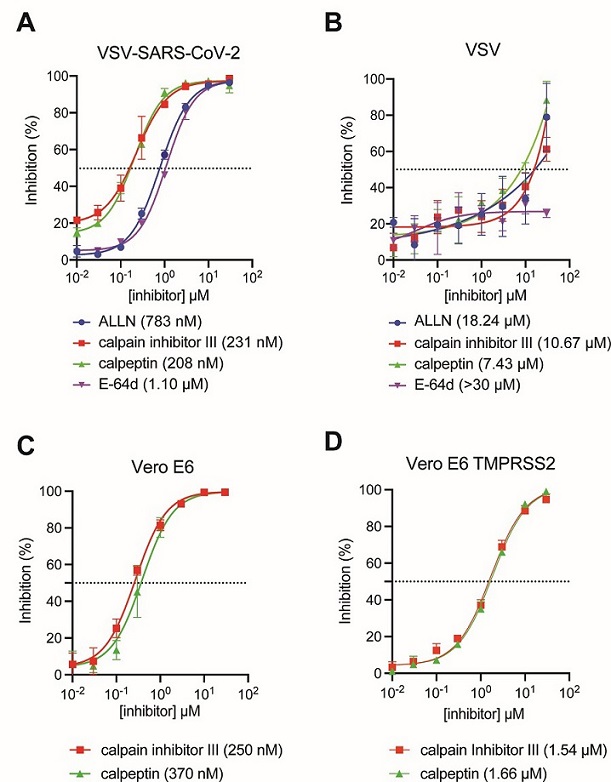Nikhil Prasad Fact checked by:Thailand Medical News Team Feb 14, 2024 2 years, 1 week, 6 days, 1 hour, 56 minutes ago
COVID-19 News: The global battle against the coronavirus disease 2019 (COVID-19) has spurred intense research into identifying effective antiviral treatments. One significant focus has been on developing drugs that directly target key viral factors, such as the RNA-dependent RNA polymerase (RdRp) and the viral main protease (Mpro). However, a groundbreaking study covered in this
COVID-19 News report conducted at the Washington University School of Medicine in St. Louis, Missouri, USA, has unveiled a novel pathway involving calpain-2 (CAPN2) in the SARS-CoV-2 entry process, providing a fresh perspective on potential therapeutic strategies.
 Calpain inhibitors potently inhibit VSV-SARS-CoV-2 infection. (A) MA104 cells were pretreated with ALLN, calpain inhibitor III, calpeptin, and E-64d at concentrations ranging from 0.01 to 30 µM for 1 h prior to a 24 h infection by VSV-SARS-CoV-2 (MOI = 1). GFP signals were quantified and plotted as percentage of inhibition corresponding to dosage. EC50s values are as indicated. (B) Same as (B) except that VSV was used for infection instead of VSV-SARS-CoV-2. (C) Same as (B) except that Vero E6 cells were used instead of MA104 cells. (D) Same as (B) except that Vero E6 TMPRSS2 cells were used instead of MA104 cells.
Antiviral Strategies and the Role of Main Protease
Calpain inhibitors potently inhibit VSV-SARS-CoV-2 infection. (A) MA104 cells were pretreated with ALLN, calpain inhibitor III, calpeptin, and E-64d at concentrations ranging from 0.01 to 30 µM for 1 h prior to a 24 h infection by VSV-SARS-CoV-2 (MOI = 1). GFP signals were quantified and plotted as percentage of inhibition corresponding to dosage. EC50s values are as indicated. (B) Same as (B) except that VSV was used for infection instead of VSV-SARS-CoV-2. (C) Same as (B) except that Vero E6 cells were used instead of MA104 cells. (D) Same as (B) except that Vero E6 TMPRSS2 cells were used instead of MA104 cells.
Antiviral Strategies and the Role of Main Protease
SARS-CoV-2's high mutation rates have posed considerable challenges for antiviral drug development. Two prominent FDA-authorized antiviral drugs, Remdesivir and Molnupiravir, target the viral RNA-dependent RNA polymerase (RdRp), inhibiting viral replication. Another crucial target is the viral main protease (Mpro), involved in processing viral polyproteins. Drugs like Paxlovid and various calpain inhibitors have demonstrated efficacy against Mpro, providing hope for combating SARS-CoV-2.
Calpain Inhibitors and their Unique Role
In a recent drug repurposing screen, calpain inhibitors, known for their effectiveness against Mpro, were found to inhibit the infection of a chimeric vesicular stomatitis virus (VSV) encoding the SARS-CoV-2 spike protein. This inhibition, however, was notably absent in the case of the wild-type VSV. This intriguing observation led researchers to delve deeper into an Mpro-independent pathway targeted by calpain inhibitors, revealing an unexplored facet of their antiviral activity.
Identification of Calpain-2 as a Novel Host Factor
Genetic knockout of calpain-2 (CAPN2) using CRISPR/Cas9 technology demonstrated that cells lacking CAPN2 exhibited resistance to the chimeric VSV-SARS-CoV-2 virus and a clinical isolate of wild-type SARS-CoV-2. The study elucidated the mechanistic role of calpain-2 in facilitating SARS-CoV-2 entry, particularly through its positive regulation of the cell surface levels of ACE2—the cellular receptor crucial for viral attachment and entry.
Importance of Calpain Inhibitors
The significance of this discovery lies in its extension beyond the known antiviral activities of calpain inhibitors against Mpro. The study highlights an Mpro-in
dependent mechanism targeted by calpain inhibitors for efficient viral inhibition. Crucially, calpain-2 emerges as a novel host factor influencing the SARS-CoV-2 entry process, underscoring its potential as a therapeutic target.
Mechanistic Insights and Dual Inhibition Potential
The researchers' in-depth analysis of the cellular process of SARS-CoV-2 entry provides novel insights into the mechanism of action of calpain inhibitors. Notably, these findings suggest a dual inhibition potential of calpain inhibitors—targeting both viral entry and replication. This dual mechanism could prove invaluable in the clinical setting of COVID-19, offering a multifaceted approach to combat the virus.
Study Methodology and Robust Results
The study's robust methodology involved a series of experiments, including drug screens, genetic knockout studies, and virological assays. Calpain inhibitors, with a particular emphasis on calpain inhibitor III and calpeptin, demonstrated potent inhibition against VSV-SARS-CoV-2, affirming their efficacy in the absence of Mpro.
CAPN2 Knockout and its Impact on Viral Infection
The genetic knockout of CAPN2 in cells provided compelling evidence of its pivotal role in viral entry. Cells lacking CAPN2 exhibited a significant reduction in the infection of VSV-SARS-CoV-2, emphasizing the critical involvement of calpain-2 in the early steps of the SARS-CoV-2 replication cycle.
Strain-Specific Effects and Human Enteroid Study
Exploring the impact of CAPN2 on different SARS-CoV-2 strains revealed intriguing strain-specific effects. Additionally, human enteroid studies demonstrated a positive correlation between CAPN2 expression levels and susceptibility to coronavirus infection, underscoring the relevance of these findings in physiologically relevant human cells.
Conclusion
In conclusion, this groundbreaking research provides a comprehensive understanding of calpain-2 as a novel regulator of SARS-CoV-2 entry through ACE2 modulation. Beyond the known antiviral activities against Mpro, calpain inhibitors offer a promising avenue for dual inhibition, targeting both viral entry and replication. With calpain-2 identified as a potential therapeutic target, these findings open new doors for the development of effective antiviral strategies against SARS-CoV-2. As the global fight against COVID-19 continues, the study offers a ray of hope and a fresh perspective in the quest for innovative and multifaceted treatments.
The study findings were published in the peer reviewed journal: mBio.
https://journals.asm.org/doi/10.1128/mbio.02287-23
For the latest
COVID-19 News, keep on logging to Thailand Medical News.
